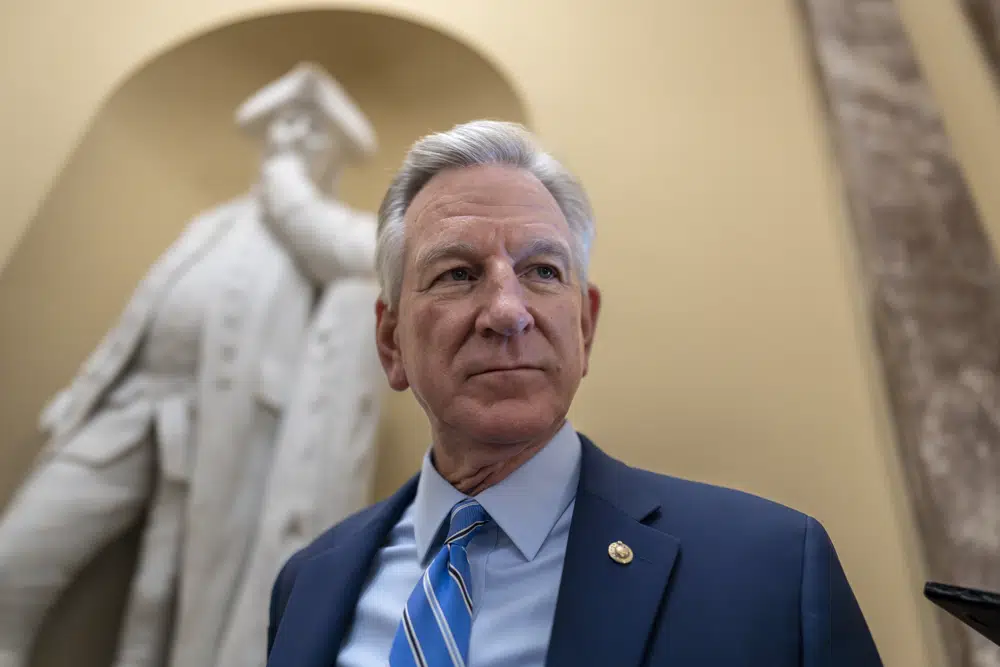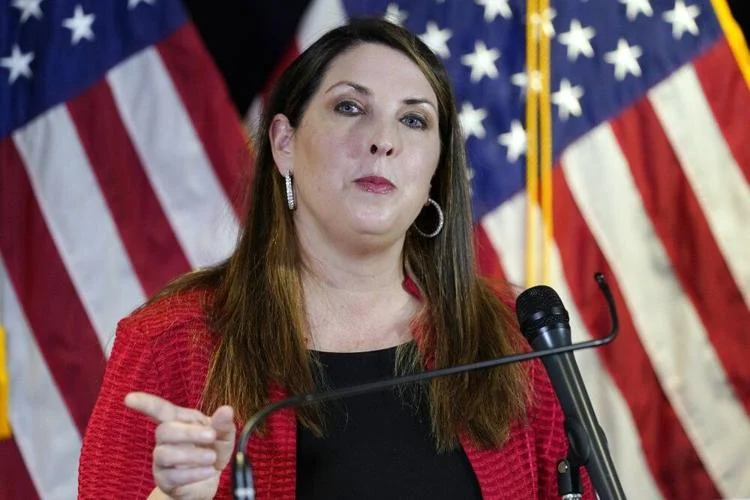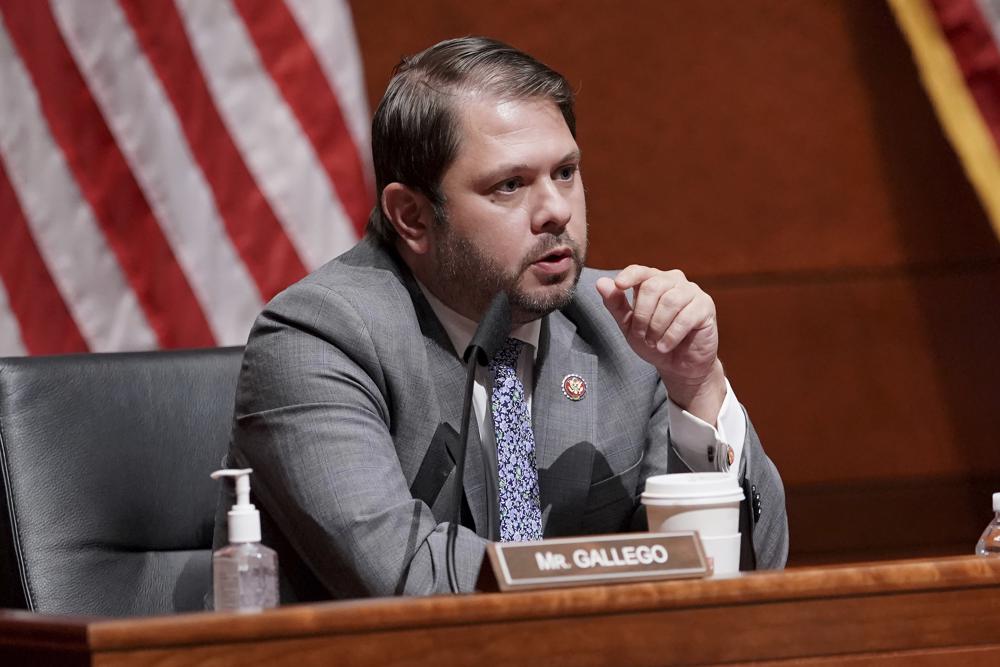Senators Katie Britt and Pete Ricketts introduce bill to strengthen oversight of U.S.-China science and technology agreements

U.S. Senator Katie Britt (R-Alabama) recently joined Senator Pete Ricketts (R-Nebraska) and 14 colleagues in introducing the Science and Technology Agreement Enhanced Congressional Notification Act. The bill would strengthen oversight of science and technology agreements (STAs) between the U.S. and the People’s Republic of China (PRC) by requiring the Secretary of State to provide comprehensive details to Congress about any new, renewed, or extended agreement and establishing a minimum 30-day Congressional review period. This transparency and accountability provision would include thorough national security risk assessments, human rights considerations, and consistent monitoring mechanisms. “It is simply common sense that proper Congressional oversight be conducted over any science and technology agreement the United States makes with the Chinese Communist Party,” said Sen. Britt. “The CCP is our greatest geopolitical and national security threat, and everything they do is as our adversary. The FBI has said that they open a new counterintelligence case against China about twice per day. From stealing our intellectual property and spying on our children through TikTok, to buying up American farmland and engaging in unfair trade practices that undercut Alabama steelmakers and shrimpers, we must hold the CCP accountable. We accomplish this through strength, not continued weakness.” “The Biden administration has failed to stand up to the Chinese Communist Party time and time again,” Sen. Ricketts said. “There is no daylight between the Communist regime and the private sector in the People’s Republic of China. The CCP will manipulate or disregard rules to gain technological and military advantages that put our national security at risk. Congressional oversight is necessary before we enter into science and technology agreements with our chief adversary. As the administration attempts to negotiate a stronger agreement, it should have to show its work. This bill would make sure that happens.” Joining Senators Britt and Ricketts in co-sponsoring this legislation were Ranking Member of the Committee on Senate Foreign Relations Jim Risch (R-Idaho) and Senators Deb Fischer (R-Nebraska), Tim Scott (R-South Carolina), Marco Rubio (R-Florida), John Cornyn (R-Texas), Todd Young (R-Indiana), Joni Ernst (R-Iowa), Steve Daines (R-Montana), Cynthia Lummis (R-Wyoming), James Lankford (R-Oklahoma), Thom Tillis (R-North Carolina), Ted Cruz (R-Texas), Ted Budd (R-North Carolina), and Mitt Romney (R-Utah). The bill prohibits the Secretary of State from renewing or extending the STA until he has provided Congress with at least 30 days to review the full text of the agreement as well as a detailed justification for the STA, including an explanation as to why such agreement is in the national security interests of the United States. The Secretary of State would also have to provide Congress with an assessment of the risks and potential effects of such an agreement, including any potential for the transfer under such agreement of technology or intellectual property capable of harming the national security interests of the United States. In addition, the bill requires that the Secretary provide a detailed justification for how the Secretary intends to address human rights concerns in any scientific and technology collaboration proposed to be conducted under such agreement, as well as an assessment of the extent to which the Secretary will be able to continuously monitor the commitments made by the PRC under such agreement. If this legislation is actually passed by Congress and signed into law by the President, once enacted, it would require the Secretary to provide Congress with the necessary reporting requirements listed above within 60 days of enactment, or any existing STA with the PRC will be revoked. U.S. Representative Andy Barr (R-Kentucky) has introduced companion legislation in the House of Representatives. Since the U.S.-China Science and Technology Agreement was originally signed in 1979, China has progressed technologically at a rapid pace and has achieved parity with the United States in many areas. The agreement has been renewed about every five years since then. It serves as the framework that facilitates research cooperation between the governments of the United States and PRC and academic institutions in both countries. The STA was last renewed in 2018 and was set to expire last month. However, the Biden administration recently extended the STA for another six months. There are ongoing concerns that research partnerships organized under the STA have strengthened the PRC’s military-industrial complex and potentially could be used to develop technologies that could later be used against the U.S. In one glaring example, in 2018, under the STA, the National Oceanic and Atmospheric Administration (NOAA) organized a project with China’s Meteorological Administration to launch weather balloons to study the atmosphere. Just a few months ago, similar balloon technology was used to surveil U.S. military sites on U.S. territory. A U.S. fighter aircraft had to shoot the balloons down – likely after the balloons had passed on valuable intelligence about U.S. military bases, including ICBM sites. Katie Britt was elected to the Senate in 2022. To connect with the author of this story or to comment, email brandonmreporter@gmail.com.
Katie Britt calls Biden Administration $6 billion payout to Iran “shameful”

U.S. Senator Katie Britt (R-Alabama) released a statement condemning the deal with Iran after the Biden Administration formally notified Congress that it will unfreeze $6 billion in Iranian assets and release five Iranians currently detained by the United States in exchange for the return of five Americans currently being held captive. “The deal itself is shameful enough. But the Biden Administration choosing today of all days to notify Congress that the President is handing $6 billion to the biggest state sponsor of terrorism in the world just adds insult to injury,” Senator Britt wrote. “This irresponsible, weak appeasement sends a terrible message across the globe and only incentivizes further hostage-taking in the future. There is no doubt that President Biden’s actions once again endanger our national security and dishonor the sacrifice of American men and women who have fought valiantly for our country.” “If we’re paying a billion dollars per kidnapped individual, then you’re going to see more kidnappings,” said Sen. Mitt Romney (R-Utah). “That’s why you don’t negotiate with terrorists; that’s why you don’t negotiate with kidnappers. The idea of basically paying to release, in this effect, a hostage is a terrible idea.” “It’s ridiculous for US to be blackmailed into paying $6B for hostages which will help indirectly finance the number 1 foreign policy of Iran: terrorism,” Sen. Chuck Grassley (R-Iowa) wrote. “Last time it was $1.7B traded for hostages next time it will probably be $10B the price keeps going up & up.” Secretary of State Antony Blinken last week issued the sanction waiver to allow the frozen Iranian funds to move from South Korea to Qatar, which Iran could then use. “I determine that it is in the national security interest of the United States to waive the imposition of sanctions … with respect to foreign financial institutions under the primary jurisdiction of Germany, Ireland, Qatar, the Republic of Korea, and Switzerland that are notified directly in writing by the U.S. government, to the extent necessary for such institutions to engage in transactions occurring on or after August 9, 2023,” Blinken wrote. Last month, Senator Britt joined a group of 25 Republican colleagues in demanding answers from the Biden Administration about the specifics of the proposed deal with Iran. Katie Britt was elected to the U.S. Senate in 2022 after working as an attorney, the President and CEO of the Business Council of Alabama (BCA), and as former Senator Richard Shelby’s chief of staff. To connect with the author of this story or to comment, email brandonmreporter@gmail.com.
Mitch McConnell and other Republican Senators denounce White nationalism after Tommy Tuberville’s refusal to denounce White nationalists as racists

U.S. Senator Tommy Tuberville (R-Alabama) is being widely criticized for his comments on White nationalists in a recent CNN interview. On Tuesday, U.S. Sen. Mitch McConnell (R-Kentucky) responded, saying there is no place for White nationalists in the military or the country. “White supremacy is simply unacceptable in the military and in our whole country,” McConnell told reporters. The number two Republican in the Senate, Minority Whip John Thune (South Dakota), said there’s no room for white nationalists in the GOP or the military. “I just think there isn’t any place for it,’ Thune said. “We are a country obviously that has built around a set of principles that’s welcoming.” “Ethnic nationalism is un-American, and I think it would be problematic in the military,” said Sen. Marco Rubio (R-Florida). “My definition of a White nationalist is someone that believes that America belongs to white people. That’s not American, that’s un-American, and that would be a problem in the military,” “White supremacy and racism have absolutely no place in our country. Period. The end,” Sen. Katie Britt (R-Alabama) told reporters. This controversy began during an NPR interview in Alabama when Tuberville was asked if White nationalists should be able to serve in the military. “Well, they call them that. I call them Americans,” Tuberville answered. Tuberville followed those comments with an interview Monday on CNN. CNN host Kaitlan Collins said a White nationalist is “someone who believes that the white race is superior to other races.” “Well, that’s some people’s opinion,” Tuberville responded. “My opinion of a White nationalist, if someone wants to call them a White nationalist, to me, is an American. It’s an American. Now, if that White nationalist is a racist, I’m totally against anything that they want to do because I am 110 percent against racism.” Tuberville said White nationalism is “just a cover word for the Democrats now where they can use it to try to make people mad across the country.” Senate Majority Leader Chuck Schumer (D-New York) chastised Tuberville for his opinion, “The senator from Alabama is wrong, wrong, wrong. The definition of White nationalism is not a matter of opinion. “For the Senator from Alabama to obscure the racist nature of white nationalism is indeed very, very dangerous,” Schumer said. “He is fanning the flames of bigotry and intolerance.” “I don’t think Senator Tuberville is in any way racist,” said Sen. Mitt Romney (R-Utah) when asked about Tuberville. “I am totally against anything racist,” Tuberville emphasized. “My opinion of a White nationalist, if you want to call them that, is an American.” Tuberville chastised Democrats for dividing this country and making it weaker. This is not the first gaffe that Tuberville has made on the national stage. Tuberville was criticized in October when he seemed to be saying those Americans who want reparations for slavery are responsible for committing crimes. “They’re not soft on crime. They’re pro-crime. They want crime,” Tuberville said of Democrats. “They want crime because they want to take over what you got. They want to control what you have. They want reparations because they think the people that do the crime are owed that. Bulls**t. They are not owed that.” Tuberville was in Nevada campaigning for GOP Senate candidate Adam Laxalt. Laxalt lost to incumbent Sen. Catherine Cortez-Masto 48.9 to 48.0% a month later. Tuberville has also been widely criticized for his hold on military promotions over the Pentagon’s controversial abortion policy. Tuberville has refused to vote yes on unanimous consent to the promotions over his opposition to the Biden administration’s efforts to thwart pro-life state laws for military members and their families. Despite the criticism from Washington, the Hill reports that Tuberville remains overwhelmingly popular in Alabama, with a commanding majority of Alabamians holding favorable views of the senior Senator from Alabama. To connect with the author of this story or to comment, email brandonmreporter@gmail.com.
Katie Britt, Rick Scott and colleagues urge Biden Administration to address passport delays

On Monday, U.S. Senator Katie Britt (R-Alabama) announced that she has joined Senator Rick Scott (R-Florida) and 12 of their colleagues in a letter to Secretary of State Antony Blinken urging him to take immediate action to resolve the backlog of passport applications. “Given the sheer number of Alabamians who have recently requested help with a passport issue, I’m concerned that action has not been taken sooner to address this concern, which clearly affects a great number of Alabamians,” said Sen. Britt. “As record levels of Americans continue to book flights across the globe, we request this matter be dealt with immediately and transparently to prevent further backlog.” More Americans are seeking passports, and there are growing delays in obtaining or renewing a passport. According to a recent report, it can take 17 weeks to get a passport renewed. This turnaround time has grown several weeks just since February. In the letter, the Senators note countless reports from Americans in their respective states regarding issues and concerns with delayed wait times, lack of available in-person appointments, and an inability to communicate with passport agencies. The Senators charge that this is an unacceptable failure from a federal government that should be focused on serving American taxpayers and their needs. Joining Senators Britt and Scott were U.S. Senators Bill Cassidy (R-Louisiana), Ted Cruz (R-Texas), Mike Crapo (R-Idaho), John Barrasso (R-Wyoming), Cynthia Lummis (R-Wyoming), Ted Budd (R-North Carolina), Marco Rubio (R-Florida), JD Vance (R-Ohio), Mitt Romney (R-Utah), Joni Ernst (R-Iowa), and Deb Fischer (R-Nebraska). “As summer begins and families across the nation are finalizing their travel plans, we have heard countless reports from constituents in our states about the massive backlogs in processing passport applications,” the Senators wrote to Sec. Blinken. “While we appreciate the hard work of Passport Agency employees across the nation, this backlog and the unresponsiveness to many passport inquiries is unacceptable.” “Since January 2023, our offices have observed a massive increase in passport-related inquiries from our constituents,” the Senators continued. “We understand that the Department of State is experiencing an unprecedented number of passport applications and renewals, but the strategies put in place to address this unprecedented demand appear to need additional attention.” “These backlogs have resulted in many American families being forced to cancel their travel plans because of increased wait times, a lack of available in-person appointments, and an inability to communicate with passport agencies,” wrote the Sens. “Furthermore, the delay many Americans are experiencing in receiving their passport could potentially be detrimental to their livelihood. The Department of State must address these issues promptly to remedy the situation. As our offices continue to work each and every day to assist constituents with their passport needs.” Many countries require a passport to be valid six months after your trip ends. These include India, Kenya, Morocco, Peru, Singapore, Thailand, Turks and Caicos, and Zimbabwe. All 27 European Union member countries require passports to be valid for at least three months beyond the date of departure. Some countries are more visitor-friendly and only require your passport to be valid. These include Argentina, Australia, Dominican Republic, Japan, and the United Kingdom. For travel to Hong Kong, the requirement is one month beyond the trip. Since renewing a passport can take four months, plan accordingly if you have plans to travel or work in a field where foreign travel may be required at some point. Katie Britt was elected to the Senate in 2022 after a career as a lobbyist, attorney, and Sen. Richard Shelby’s chief of staff. To connect with the author of this story or to comment, email brandonmreporter@gmail.com.
Katie Britt and colleagues introduce legislation to require federal agencies to publish their regulatory guidance on the internet

U.S. Senators Katie Britt and Ron Johnson and 14 of their colleagues reintroduced the Guidance Out of Darkness (GOOD) Act, which requires federal agencies to publish their regulatory guidance on the internet in an easily accessible location. Sponsors claim that the GOOD Act will enhance the transparency of guidance documents issued by government agencies, helping all entities — including small businesses, workers, and households — to comply with regulations. The bill was advanced by the Senate Homeland Security and Governmental Affairs Committee by voice vote twice and passed the House in 2018. “Sunlight is often the best disinfectant, and that’s exactly what the Biden Administration’s runaway red tape regime needs,” said Sen. Britt. “Unelected federal bureaucrats should not be taking actions that affect hardworking Americans’ lives without robust transparency and the opportunity to hold them publicly accountable. This is a commonsense measure that my colleagues on both sides of the aisle should support.” “As an advocate for transparency and accountability in government, I am proud to reintroduce the Guidance Out of Darkness Act. This bill reduces the regulatory burden placed on small businesses, workers, and households by holding federal agencies accountable,” stated Sen. Johnson. “Increasing transparency and simplifying the regulatory process will further economic growth for all Americans. I look forward to working with my colleagues to advance this bill and provide the American people with the transparency they deserve.” Senators Britt and Johnson were joined on the legislation by Sens. Mike Braun (R-Indiana), Kevin Cramer (R-North Dakota), Ted Cruz (R-Texas), Joni Ernst (R-Iowa), Lindsey Graham (R-South Carolina), James Lankford (R-Oklahoma), Mike Lee (R-Utah), Cynthia Lummis (R-Wyoming), Rand Paul (R-Kentucky), Rick Scott (R-Florida), Thom Tillis (R-North Carolina), Bill Hagerty (R-Tennessee), Marsha Blackburn (R-Tennessee), and Mitt Romney (R-Utah). “Transparency in government is crucial. That is why I am proud to join Senator Ron Johnson in sponsoring the GOOD Act. People deserve to know just what government agencies are up to, especially when it comes to their hard-earned tax dollars,” said Sen. Scott. “This bill will bring commonsense reform and shed light on how the government operates—which is something we should all support.” “People in Wyoming deserve transparency from the federal government, which is why I’m joining my colleague Senator Ron Johnson in introducing the Guidance Out of Darkness Act,” said Sen. Lummis. “This bill would require federal agencies to post regulations and guidance to the agency website, making it easy for small businesses, workers, and the people of Wyoming to know about the federal regulations that impact their daily lives.” “Unlike other regulatory actions, agency guidance documents are not required to undergo the public notice and comment process. James Madison warned that our laws would be of little use if they can ‘be repealed or revised before they are promulgated, or undergo such incessant changes, that no man who knows what the law is today, can guess what it will be tomorrow,’” said Sen. Lee. “I’m proud to cosponsor Sen. Johnson’s legislation to reduce the regulatory burden placed on small businesses, workers, and American households and increase transparency for all the entities needed to comply.” Navigating through all of the regulations promulgated by federal agencies and keeping up to date with all of the periodic changes to guidance as well as administrative reinterpretations and changes of previous rules can be very difficult for businesses operating in those regulated agencies. Katie Britt is serving in her first term in the U.S. Senate after her election in November. To connect with the author of this story or to comment, email brandonmreporter@gmail.com.
Katie Britt believes Alabama taxpayers do not want taxes paying for elective abortions

United States Senators Katie Britt and Roger Wicker joined 45 other Senators in introducing the No Taxpayer Funding for Abortion Act. This legislation would establish a single, government-wide standard to permanently prohibit the flow of federal funding for abortion. “The vast majority of Alabamians do not want their hard-earned dollars funding elective abortions in California and New York,” Britt stated. “The Hyde Amendment has saved an estimated 2.5 million lives – approximately half the population of Alabama,” said Sen. Britt. “Sadly, radicals in the Democratic Party continue to trumpet their calls for abortion at any time, for any reason. They have now targeted the long-standing, bipartisan Hyde Amendment, annually passed by Congress since 1976, which ensures federal taxpayer dollars are not used to fund abortions. It is time to make the Hyde Amendment and its lifesaving protections permanent so the far-left does not attempt to hold the nation hostage every year. The vast majority of Alabamians do not want their hard-earned dollars funding elective abortions in California or New York. I will continue to fight to defend life, support parents, grow opportunities for hardworking families, and preserve the American Dream for our children and our children’s children.” “Most Americans do not want their hard-earned tax dollars being used for abortion-on-demand, but our current patchwork of regulations has brought years of uncertainty,” stated Sen. Wicker. “The No Taxpayer Funding for Abortion Act would simplify federal rules, ensuring that American tax dollars are never used for the destruction of innocent, unborn life.” This legislation would make permanent the restrictions on funding for elective abortion and elective abortion coverage, including the Hyde Amendment, which currently relies on yearly approval. It would also eliminate Obamacare’s taxpayer subsidies for elective abortion coverage on the Affordable Care Act exchanges through refundable tax credits. U.S. Sen. Tommy Tuberville (R-Alabama) also co-sponsored the legislation. “Millions of hardworking Americans believe that life begins at conception and don’t want their taxpayer dollars inadvertently funding abortions,” said Sen. Tuberville. “As a Christian and as a conservative, I share their belief that every life is sacred and every American has a right to life. That’s why I’m proud to sign on to this legislation that will solidify abortion funding restrictions that have been in place for decades and better protect the unborn.” Britt, Tuberville, and Wicker joined Sens. Mitch McConnell (R-Kentucky) John Barrasso (R-Wyoming), Marsha Blackburn (R-Tennessee), John Boozman (R-Arkansas), Mike Braun (R-Indiana), Ted Budd (R-North Carolina), Shelley Moore Capito (R-West Virginia), Bill Cassidy (R-Louisiana), John Cornyn (R-Texas), Tom Cotton (R-Arkansas), Kevin Cramer (R-North Dakota), Mike Crapo (R-Idaho), Ted Cruz (R-Texas), Steve Daines (R-Montana), Joni Ernst (R-Iowa), Deb Fischer (R-Nebraska), Lindsey Graham (R-South Carolina), Chuck Grassley (R-Iowa), Bill Hagerty (R-Tennessee), Josh Hawley (R-Missouri), John Hoeven (R-North Dakota), Cindy Hyde-Smith (R-Mississippi), Ron Johnson (R-Wisconsin), John Kennedy (R-Louisiana), James Lankford (R-Oklahoma), Mike Lee (R-Utah), Cynthia Lummis (R-Wyoming), Roger Marshall (R-Kansas), Jerry Moran (R-Kansas), Markwayne Mullin (R-Oklahoma), Rand Paul (R-Kentucky), Pete Ricketts (R-Nebraska), Jim Risch (R-Idaho), Mitt Romney (R-Utah), Mike Rounds (R-South Dakota), Marco Rubio (R-Florida), Eric Schmitt (R-Missouri), Rick Scott (R-Florida), Tim Scott (R-South Carolina), Dan Sullivan (R-Alaska), Thom Tillis, (R-North Carolina), John Thune (R-South Dakota), J.D. Vance (R-Ohio), and Todd Young (R-Indiana). With Democrats in control of the Senate, it is unlikely that Senate Majority Leader Chuck Schumer will allow this bill to even be introduced on the Senate floor. To connect with the author of this story or to comment, email brandonmreporter@gmail.com.
Tommy Tuberville supports bill to permanently ban taxpayer funding for abortions

U.S. Senators Tommy Tuberville and Katie Britt joined 45 of their Senate colleagues in introducing the No Taxpayer Funding for Abortion Act to establish a permanent prohibition on federal funding for abortion. Tuberville said in a statement, “Every life is sacred.” “Millions of hardworking Americans believe that life begins at conception and don’t want their taxpayer dollars inadvertently funding abortions,” said Sen. Tuberville stated. “As a Christian and as a conservative, I share their belief that every life is sacred and every American has a right to life. That’s why I’m proud to sign on to this legislation that will solidify abortion funding restrictions that have been in place for decades and better protect the unborn.” “Most Americans do not want their hard-earned tax dollars being used for abortion-on-demand, but our current patchwork of regulations has brought years of uncertainty,” Sen. Roger Wicker said. “The No Taxpayer Funding for Abortion Act would simplify federal rules, ensuring that American tax dollars are never used for the destruction of innocent, unborn life.” The bill seeks to change 40 years of inconsistent policies that have regulated federal funding for abortion. It would make funding restrictions permanent for abortion and elective abortion coverage, including the Hyde Amendment, which requires annual approval. The legislation would also eliminate taxpayer-funded subsidies for elective abortion coverage currently offered on Affordable Care Act exchanges through refundable tax credits. Tuberville, Wicker, and Britt joined Sens. Mitch McConnell (R-Kentucky) John Barrasso (R-Wyoming), Marsha Blackburn (R-Tennessee), John Boozman (R-Arkansas), Mike Braun (R-Indiana), Ted Budd (R-North Carolina), Shelley Moore Capito (R-West Virginia), Bill Cassidy (R-Louisiana), John Cornyn (R-Texas), Tom Cotton (R-Arkansas), Kevin Cramer (R-North Dakota), Mike Crapo (R-Idaho), Ted Cruz (R-Texas), Steve Daines (R-Montana), Joni Ernst (R-Iowa), Deb Fischer (R-Nebraska), Lindsey Graham (R-South Carolina), Chuck Grassley (R-Iowa), Bill Hagerty (R-Tennessee), Josh Hawley (R-Missouri), John Hoeven (R-North Dakota), Cindy Hyde-Smith (R-Mississippi), Ron Johnson (R-Wisconsin), John Kennedy (R-Louisiana), James Lankford (R-Oklahoma), Mike Lee (R-Utah), Cynthia Lummis (R-Wyoming), Roger Marshall (R-Kansas), Jerry Moran (R-Kansas), Markwayne Mullin (R-Oklahoma), Rand Paul (R-Kentucky), Pete Ricketts (R-Nebraska), Jim Risch (R-Idaho), Mitt Romney (R-Utah), Mike Rounds (R-South Dakota), Marco Rubio (R-Florida), Eric Schmitt (R-Missouri), Rick Scott (R-Florida), Tim Scott (R-South Carolina), Dan Sullivan (R-Alaska), Thom Tillis, (R-North Carolina), John Thune (R-South Dakota), J.D. Vance (R-Ohio), and Todd Young (R-Indiana). Swing Republican Sens. Lisa Murkowski and Susan Collins did not sign off on the legislation, and neither did any of the 52 Senate Democrats who hold the majority in the body. U.S. Representative Christopher Smith (R-New Jersey) has introduced similar legislation in the House of Representatives. To connect with the author of this story, or to comment, email brandonmreporter@gmail.com.
U.S. Senators Katie Britt and Tommy Tuberville support school choice week

U.S. Senators Katie Britt and Tommy Tuberville released statements supporting the annual National School Choice Week, which runs from January 22 through January 28, 2023. Sens. Britt and Tuberville have co-sponsored bipartisan resolutions authored by Senator Tim Scott that would formally designate this week as “National School Choice Week” and celebrates educational freedom and excellence throughout our country. “This National School Choice Week, let’s recommit to ensuring that every single child across Alabama and our nation has the opportunity to unlock the American Dream through a high-quality education,” said Sen. Britt. “No child’s zip code should determine their destiny. School choice empowers families with the freedom to make important decisions to help their children achieve their full potential and secure a bright future.” “Nothing rivals the opportunity and freedom that come with a quality education,” Sen. Tuberville said. “The COVID-19 pandemic underscored the need for ensuring our students aren’t subject to educational disadvantages because of their background or location. I’m committed to breaking down educational barriers so that the next generation of leaders are empowered to achieve the American Dream, which is why I’m proud to join this resolution recognizing National School Choice Week.” Other resolution sponsors include U.S. Sens. Mike Braun (R-Indiana), Ted Budd (R-North Carolina), Bill Cassidy (R-Louisiana), John Cornyn (R-Texas), Tom Cotton (R-Arkansas), Kevin Cramer (R-North Dakota), Ted Cruz (R-Texas), Steve Daines (R-Montana), Lindsay Graham (R-South Carolina), Bill Hagerty (R-Tennessee), Cindy Hyde-Smith (R-Mississippi), Ron Johnson (R-Wisconsin), James Lankford (R-Oklahoma), Mitch McConnell (R-Kentucky), Mitt Romney (R-Utah), Marco Rubio (R-Florida), Rick Scott (R-Florida), Thom Tillis (R-North Carolina), and Todd Young (R-Indiana). Tuberville is a former coach, mentor, and educator for more than 40 years. Tuberville spoke on the floor of the Senate, expressing his commitment to promoting educational choice opportunities for students. Tuberville called on the U.S. Department of Education to reconsider proposed rules to redefine the Charter School Program (CSP) that would strip parents of the ability to choose the best school for their child. Tuberville also introduced the Children Have Opportunities in Classrooms Everywhere (CHOICE) Act to allow low-income families with children in grades K-12 to use federal education funds for educational options that best fit their needs. Last week Britt visited Dunbar Magnet School in Mobile, Alabama, where she attended a civics class, a dance class, and a physical education class before speaking to a school-wide assembly. Dunbar is a public magnet school for grades six through eight. When it comes to education, Britt said that she believes that one size does not fit all. Every family should be empowered to make the best possible choice for their child’s education. For many, that may be their local traditional public school. For others, it might be a traditional public school elsewhere. It could be a public charter or magnet school, a private school, a trade school, homeschooling, or a virtual academy or hybrid solution. “I trust parents to make the best choices for their individual children,” Britt said. “In the Senate, I will fight for their right to do just that.” Congressman John Moolenaar (R-Michigan) introduced the companion resolution in the U.S. House of Representatives. Tuberville and Britt are serving in their first terms representing Alabama in the Senate, with Tuberville being elected in 2020 and Britt being elected in 2022. To connect with the author of this story, or to comment, email brandonmreporter@gmail.com.
Sen. Katie Britt votes against confirming Brendan Owens

On Monday, U.S. Senator Katie Britt today cast her first-ever vote in the Senate; when she voted against the confirmation of Brendan Owens to serve as Assistant Secretary for Energy, Installations, and Environment in the Department of Defense. Owens was originally nominated by President Joe Biden in March 2022 but failed to muster the support to get a floor vote during the 117th Congress. President Biden re-nominated Owens in January 2023 at the start of the 118th Congress. “The Biden Administration has consistently prioritized their reckless leftwing political agenda to the detriment of our military readiness,” said Sen. Britt. “This nominee would simply be the tip of the spear in continuing President Biden’s radical ‘Green New Deal’ priorities at the Department of Defense, which should be focused on ensuring our incredible men and women in uniform are the best equipped, resourced, and trained in the world. We achieve peace through strength, not wokeness. The last thing we need is a DOD appointee from the ESG movement.” The U.S. Senate confirmed Owens on Monday night with 60 “yea” and 35 “nay” votes. A number of Republicans voted to confirm Owens, including Sens. Shelley Moore Capito of West Virginia, Susan Collins of Maine, John Cornyn of Texas, Joni Ernst of Iowa, Lindsey Graham of South Carolina, Chuck Grassley of Iowa, Mitch McConnell of Kentucky, Jerry Moran of Kansas, Mitt Romney of Utah, Mike Rounds of South Dakota, Thom Tillis of North Carolina, Roger Wicker of Mississippi, and Todd Young of Indiana. Britt was elected in a landslide by the voters of Alabama in November after besting four rivals in the Alabama Republican Primary last spring. Senate is the first elected office she has ever held. Britt and her husband, Wesley, live in Montgomery with their two children. To connect with the author of this story, or to comment, email brandonmreporter@gmail.com.
Alabama Republican Party votes no confidence in RNC Chair Ronna Romney McDaniel

The Alabama Republican Party Steering Committee voted on Saturday for new leadership at the Republican National Committee (RNC). Incumbent RNC Chair Ronna Romney McDaniel is seeking re-election to the position. The Alabama Republican Party Steering Committee announced that they will not support McDaniel’s re-election. “It’s nothing personal,” Alabama Republican Party Chairman John Wahl told Alabama Today Monday. Wahl acknowledged that there are a number of factors in why the GOP has underwhelmed in recent elections. “It’s not all her fault,” Wahl said, emphasizing the need for a change of direction at the RNC. “We believe that RNC leadership needs a new vision for future elections,” the Steer Committee said in a statement. “We believe that the RNC needs fresh, new leadership who can inspire and lead grassroots Republicans to victory.” “The Alabama Republican Party’s Steering Committee cannot support or endorse Ronna McDaniel for RNC Chair and declare our vote of no-confidence in her leadership,” the Steering Committee concluded. “We encourage all RNC members across the country to support new leadership at the RNC Winter Meeting.” There is growing dissatisfaction with the RNC after the Republican Party lost control of the House in 2018, former Vice President Joe Biden unseated President Donald Trump in the 2020 election, the loss of the Senate when two GOP incumbents were defeated in the Georgia election runoffs, the failure to retake the Senate in 2022, and the GOP’s loss of some gubernatorial races – most notably Arizona – which could have consequences in 2024. Despite this, McDaniel, the niece of U.S. Sen. Mitt Romney (R-Utah), is running for a fourth term as head of the RNC. She is being challenged by Harmeet Dhillon, an RNC member from California. Supporters of McDaniel argue that the Republicans did win back control of the House of Representatives in the 2022 midterms and that the RNC has raised $1.5 billion during McDaniel’s tenure – more than any previous RNC Chair. One hundred sixty-eight delegates will decide who leads the RNC moving forward into the 2024 elections at the RNC meetings later this month. The 440-member Alabama Republican Party Executive Committee will meet on February 24th and 25th in Birmingham at the BJCC. To connect with the author of this story, or to comment, email brandonmreporter@gmail.com.
Democrats kept the Senate this year, but 2024 may be harder

Democrats celebrating a successful effort to keep control of the U.S. Senate this year will soon confront a 2024 campaign that could prove more challenging. The party enters the next cycle defending 23 seats, including two held by independents who caucus with Democrats. That’s compared with just 10 seats that Republicans hope to keep in their column. Adding to the potential hurdles is that some 2024 contests are in states that have become increasingly hostile to Democrats, including Montana, Ohio, and West Virginia. Other Democratic-held seats are in some of the same hotly contested states that were at the center of this year’s midterms, such as Pennsylvania, Arizona, and Nevada. And while Democrats carried each of those races, they did so at great cost and with sometimes narrow margins. In Nevada, for instance, Democratic incumbent Sen. Catherine Cortez Masto won by less than 1 percentage point, or about 9,000 votes. For now, both parties insist they’re laser-focused on coming out on top in the December 6 Senate runoff in Georgia. But Democrats who are on the ballot in 2024 know that they could face fierce headwinds and are studying the results of this year’s election when the party outperformed expectations. For Nevada Sen. Jacky Rosen, a Democrat facing her first reelection campaign, that means staying focused on kitchen table issues and touting legislation like the infrastructure law and gun violence legislation signed by President Joe Biden. “We know that races are always close,” Rosen said in an interview. “We never take anything for granted.” The dynamics of the next Senate campaign could be influenced by a variety of outside factors, particularly the presidential election and the attention it generates. Biden, who turned 80 this month, has said his “intention” is to run for reelection and that he will make a final decision early next year. Former President Donald Trump has already announced a third White House bid, and multiple other Republicans are lining up to launch campaigns. The eventual nominee in each party could have a profound impact on down-ballot races, including those for Senate. But perhaps the biggest question for Senate Democrats seeking reelection will be who Republicans nominate as their opponents. The GOP lost several Senate elections this year, including those in Arizona, Pennsylvania, and Nevada, after Trump-backed candidates struggled to raise money and connect with a broader, more moderate range of voters during the general election. In Nevada, the Republican field to challenge Rosen has not begun to shape up but is expected to attract several contenders. One name receiving attention is Sam Brown, a former U.S. Army captain who was awarded a Purple Heart after being severely wounded in Afghanistan. Brown ran for Senate this year and put up a strong challenge in the Republican primary before losing to Adam Laxalt, who lost in the general election to Cortez Masto. Richard Hernandez, who was Brown’s campaign adviser, said, “He has committed to his supporters that he will never stop fighting for their issues, but he has not made any decisions as to whether that involves a future run for office.” Also in the southwest, Arizona Sen. Kyrsten Sinema, a centrist Democrat, will be up for reelection. The race, like other recent statewide contests in Arizona, is expected to be very competitive. But Sinema is likely to first face a well-funded primary challenger after angering much of the Democratic base by blocking or watering down progressive priorities like a minimum wage increase or Biden’s big social spending initiatives. She has not said whether she plans to run for reelection. Sinema’s most prominent potential primary challenger is U.S. Rep. Ruben Gallego, who has a long history of feuding with Sinema. Gallego has not announced his plans for 2024 but has made it no secret that he’s thinking about challenging Sinema. He even raised money on the prospect he might oppose Sinema. An independent expenditure group is also raising money, saying it will support grassroots organizations committed to defeating Sinema in a Democratic primary. Republicans hope a bruising Democratic primary might give them an opening to win the seat after losing Senate races in Arizona in three consecutive elections. Sinema is among a trio of moderate Senate Democrats who have sometimes used their leverage in an evenly divided chamber to block or blunt some of Biden’s plans and nominees. They will also be among the party’s most vulnerable incumbents in 2024. The other two senators, Joe Manchin of West Virginia and Jon Tester of Montana, will be running as Democrats in states that Trump handily carried in 2020. Manchin has already drawn a GOP challenger in U.S. Rep. Alex Mooney, who declared a week after winning reelection that he was setting his sights on higher office. Manchin has not yet said whether he’ll run for reelection. Republicans see Tester, a three-term senator, as vulnerable, and the opportunity to run for the seat could draw a fierce primary contest between former Interior Secretary Ryan Zinke and Rep. Matt Rosendale. Zinke, who won a House seat in this year’s midterm elections, said he will decide whether to run next year, and Rosendale declined to answer. Tester has not announced if he will seek another term but has said he anticipates 2024 will be just as tough as his last race in 2018, when he beat Rosendale in a close contest. In Pennsylvania, Democratic U.S. Sen. Bob Casey has not said whether he intends to run for a fourth term. Casey easily won reelection in 2018, but Pennsylvania has been competitive for Republicans, including in this year’s Senate race won by Democrat John Fetterman. One potential Republican challenger whose name has been floated in Pennsylvania is former hedge fund CEO David McCormick, who narrowly lost the Republican primary in this year’s race to celebrity heart surgeon Dr. Mehmet Oz. McCormick advisers declined to comment on that prospect. Conservative activist Kathy Barnette, who finished a close third in the Republican primary, didn’t respond to messages about whether she’s considering a 2024 campaign. Wisconsin, which saw Republican Sen. Ron Johnson narrowly win reelection this year, is also expected to have
U.S. Senate to vote on Respect for Marriage Act; several groups say it’s unconstitutional

Several groups argue the Respect for Marriage Act (ROMA) currently before the U.S. Senate is unconstitutional and, if enacted, will eventually be struck down by the U.S. Supreme Court. The bill, HR 8404, was introduced in the House by U.S. Rep. Jerry Nadler, D-NY, on July 18 and passed by a vote of 267-157 the next day. The U.S. Senate took it up on Nov. 14. It would provide “statutory authority for same-sex and interracial marriages” and repeal several provisions of the 1996 Defense of Marriage Act (DOMA). The 1996 law received bipartisan support, including from then U.S. Sen. Joe Biden and U.S. Rep. Chuck Schumer, D-NY, and from Democratic President Bill Clinton, who signed it. When a constitutional amendment was proposed to ban same-sex marriage in 2006, Sen. Biden told Meet the Press’s Tim Russert, “I can’t believe the American people can’t see through this. We already have a law, the Defense of Marriage Act … where I voted and others … that marriage is between a man and a woman, and states must respect that. … Why do we need a constitutional amendment? Marriage is between a man and a woman.” Sixteen years later, President Biden now supports replacing DOMA provisions, which “define, for purposes of federal law, marriage as between a man and a woman and spouse as a person of the opposite sex,” with ROMA provisions “that recognize any marriage that is valid under state law,” according to the bill summary. The summary also notes that the Supreme Court ruled three marriage-related laws as unconstitutional: DOMA (U.S. v. Windsor, 2013) and state laws banning same-sex marriage (Obergefell v. Hodges, 2015), and interracial marriage (Loving v. Virginia 1967). The bill would also allow “the Department of Justice to bring a civil action and establishes a private right of action for violations,” its summary states. When filing a cloture motion on a substitute amendment on Nov. 17, now Senate Majority Leader Schumer said the Senate would vote on ROMA when it returned on Monday after Thanksgiving. He said, “Let me be clear,” passing it “is not a matter of if but only when.” He also thanked his colleagues from both sides of the aisle “who led this bill.” Twelve Republicans voted with Democrats to allow it to move forward, eliminating a filibuster threat: Sens. Roy Blunt, Richard Burr, Shelley Capito, Susan Collins, Cynthia Lummis, Rob Portman, Mitt Romney, Dan Sullivan, Thom Tillis, Joni Ernst, Lisa Murkowski, and Todd Young. After their vote, Biden said, “Love is love, and Americans should have the right to marry the person they love,” adding their vote made “the United States one step closer to protecting that right in law.” Schumer also said he had “zero doubt” the bill “will soon be law of the land.” But multiple groups disagree, arguing it’s unconstitutional for the same reasons the Supreme Court struck down DOMA. Because the court already ruled Congress doesn’t have the constitutional authority to define marriage under Article 1 of the U.S. Constitution, and because ROMA is nearly identical to DOMA, they argue it will also likely be struck down. In a letter to Congress, the nonprofit religious freedom organization Liberty Counsel argues the court ruled in Windsor, “DOMA, because of its reach and extent, departs from this history and tradition of reliance on state law to define marriage.” It also ruled, “[b]y history and tradition the definition and regulation of marriage . . . has been treated as being within the authority and realm of the separate States.” Liberty Counsel Founder and Chairman Mat Staver, said, “The Constitution cannot be said to prohibit the exercise of power to define marriage in one manner yet authorize the opposite definition of that same unconstitutional exercise of power. If Windsor noted that Congress lacked authority in this realm, then it necessarily lacks the power here.” While a bipartisan amendment was introduced claiming to protect religious liberty, Sen. Mike Lee, R-Utah, argues it really doesn’t. “Religious Americans will be subject to potentially ruinous litigation, while the tax-exempt status of certain charitable organizations, educational institutions, and non-profits will be threatened. My amendment would have shored up these vulnerabilities,” he said. Heritage Foundation President Kevin Roberts said, “Conservatives are deeply disappointed by the betrayal of Senate Republicans to protect Americans’ religious freedom and won’t soon forget the votes of the 12 Republican senators who cast aside an essential right in a bill that will weaponize the federal government against believers of nearly every major religion.” Gregory Baylor, senior counsel with Alliance for Defending Freedom, also said the law is “unnecessary and could have a disastrous effect on religious freedom. While proponents of the bill claim that it simply codifies the 2015 Obergefell decision, in reality, it is an intentional attack on the religious freedom of millions of Americans with sincerely held beliefs about marriage.” It also “threatens religious freedom and the institution of marriage” by codifying a “false definition of marriage in the American legal fabric,” ADF argues. It also “opens the door to federal recognition of polygamous relationships, jeopardizes the tax-exempt status of nonprofits that exercise their belief that marriage is the union of one man and one woman, and endangers faith-based social-service organizations by threatening litigation and liability risk if they follow their views on marriage when working with the government.” Republished with the permission of The Center Square.

